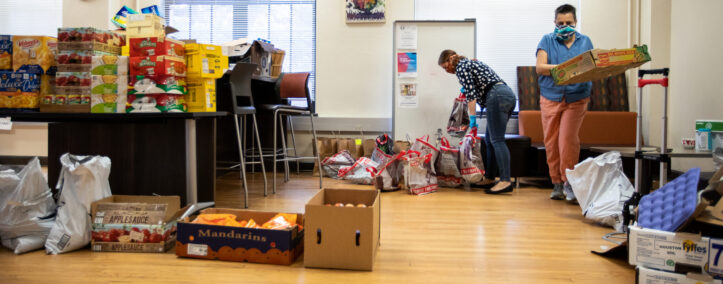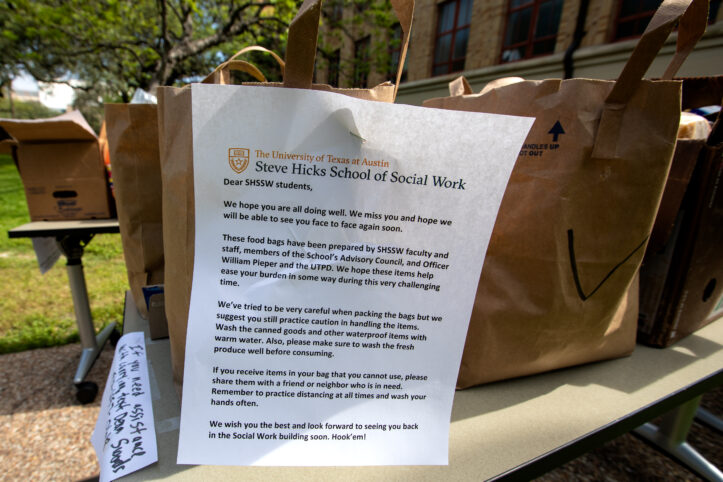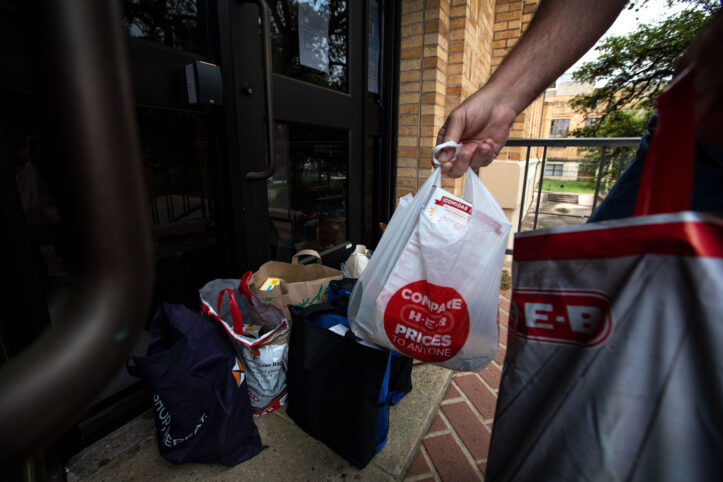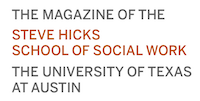The Steve Hicks School’s food pantry fulfills the spirit of social work

The coronavirus pandemic altered the lives of many. Among those forced to adjust were the very individuals the Steve Hicks School exists to serve: its students.
Social work students were forced to quickly adapt to a new learning environment while being displaced, laid off or furloughed, forced to self-isolate or care for their immunocompromised family members. The school’s administration and advisory council knew they needed to provide immediate support to students experiencing food shortages and financial issues as a result of COVID-19. The quickest and most efficient avenue to provide support was through the school’s food pantry, which was established in 2014 for social work students who needed supplemental food assistance.
Third year doctoral student Lalaine Sevillano knows first-hand how COVID-19 affected families. When her partner was furloughed, Sevillano, who cares for three generations in her household, had to figure out how to manage paying bills and feeding her family.
“I’ve always been a major support system for my family,” Sevillano said. “My parents don’t work so we were all depending on my paycheck while waiting for my partner’s furlough checks to come in. The pantry helped us tremendously.”
Assistant dean for undergraduate programs, Cossy Hough has helped with food pantry operations for the past couple years after it was originally established through personal funding from faculty and then the annual 40 Hours for the Forty Acres campaign. The pantry, which consists of cabinets filled with non-perishable food items is located in the school’s student lounge and kitchen area.
“When faculty several years ago heard our students were dealing with food insecurity, they got to work,” Hough said. “Our social work council and our staff and faculty teamed up to create a food pantry for our students, right here in the social work building. This food pantry is a microcosm of the grassroots level change we believe in.”

In March, pantry operations shifted in response to the pandemic. A committee of faculty, staff and students was formed to plan and fulfill bi-weekly, socially distanced food distribution events for students. In less than two weeks after campus closed, the committee met to prepare more than 20 packages filled with non-perishable food items such as beans, rice and pasta, for the first student food pick-up. The packages were set out in front of the school so students could anonymously pick it up on March 31.
Food variety expanded with support from the greater UT Austin community. University police officer William Pieper donated boxes of non-perishable food items and advisory council members Carla Vick, Andy Cernicky and Stacey Cernicky gave monetary donations and collected additional donations from local businesses such as Trader Joe’s and Easy Tiger Bake Shop. As a result, student food packages gained additional non-perishable food items, fresh produce such as lettuce, tomatoes, apples, oranges, bananas, bread, dessert, meat and frozen foods, a list of recipes, cooking tips and additional resources for food options including UT Outpost, Micah 6 Food Pantry and Hope Food Pantry Austin.

“The school is full of people who live what they teach,” Vick said. “The deans, faculty and staff involved with the pantry at the school are the heroes because they were doing their work while ensuring the food was procured, boxed and delivered. They went far above and beyond. The pantry was a providence that set everything in place. When COVID-19 hit, I was so grateful the infrastructure was already established and we were able to just continue to fulfill those needs.”
The food pantry fed 61 social work students and their families during the pandemic and it continues to flourish because of donations such as a refrigerator recently purchased by the Cernickys, which will become the pantry’s newest addition in September. Student food pick-ups will continue throughout the Fall semester and the committee hopes to support additional students at each event. Students in Social Work Council also are making plans for their involvement and contributions for their peers this academic year.
“Students can’t thrive unless their basic needs are matched,” Andy said. “These students are going to be great leaders in the world. They can’t receive their education if their attention is diverted because they have hungry stomachs. The Steve Hicks School has done a fantastic job identifying needs and the food pantry supplies student’s needs in real time.”
Posted by Montinique Monroe on Sept. 11, 2020.
